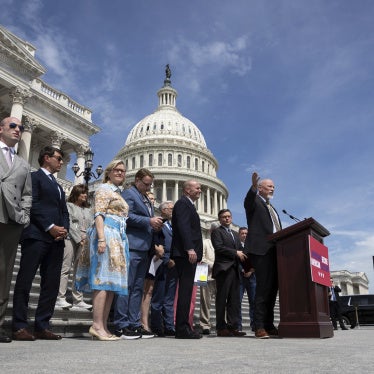Ravaged by a civil war that has claimed more than 200,000 lives, Liberia had its moment in the spotlight this summer. President Bush, on his way to Africa, pledged that America would "help the people of Liberia find the path to peace." Two thousand U.S. Marines steamed for Liberia's shores. And on Aug. 15, after the departure of Liberia's brutal leader, Charles Taylor, a "vanguard" force of 200 Americans landed in Monrovia, raising hopes among Liberians that the United States would aid them at last.
But just 10 days later, with much less fanfare, the Marines withdrew to their ships, leaving an ill-equipped and undermanned West African force in Liberia's capital. Liberia began its return to obscurity, but not yet its return to peace.
Many Liberians and Africans have drawn cynical conclusions from this episode about the Bush administration's commitment to their continent. As they see it, the United States sent its forces 99 percent of the way to Liberia -- close enough to claim credit for acting, but not so close as to assume risk or responsibility.
The administration's approach is probably not so calculated. Rather, it appears to be the product of another messy compromise between Secretary of State Colin Powell's generous definition of America's global interests and the Pentagon's narrower view. But as with many such compromises, the effect is the worst of all possible worlds: U.S. troops remain off Liberia's coast, near enough to be tarnished by failure but too far away to ensure success.
The administration's defense is that the situation in Liberia is stabilizing and that U.S. forces are no longer needed. Indeed, despite their limitations, West African peacekeepers have managed to bring some calm and hope where they have deployed -- in Monrovia, the town of Kakata and, just last week, the port of Buchanan. The problem is that peacekeepers have barely moved outside these cities to the countryside, where most Liberians live and die.
Last Friday the U.N. Security Council approved a larger mission, but that force is expected to take three or four months to deploy to Liberia. Meanwhile, in most of the country, Liberia's armed factions are seizing what they see as their last chance to loot. Armed bands continue to murder, rape and recruit children into their ranks. Thousands of people remain in hiding in the bush, where food, water, shelter and medical care are scarce or nonexistent. Fighting between rebels and government forces and continuing raids by all sides on civilians are driving more people from their homes.
In fact, reports of violence in villages outside Monrovia have increased since peacekeepers were deployed in the capital, which pushed government militias to the city's outskirts. Moreover, with no security, important parts of the country remain no-go for humanitarian workers.
A more robust U.S. military deployment would not have ended all this misery, but it would have made a difference. A significant U.S. presence in Monrovia would have had a profound psychological effect on Liberians and the leaders of the armed factions. It would have enabled West African peacekeepers to deploy outside the capital, where they are most needed. It would have made recruiting more forces from other countries easier. And even token demonstrations of U.S. power in the countryside might have increased confidence and calm.
It's not too late for the United States to redeem its promise to Liberia. The administration should be seeking funds from Congress to support the country's reconstruction, including the rebuilding of its judicial and law enforcement institutions. It should back a strong U.N. peacekeeping force with an explicit mandate to protect civilians, and a mechanism for holding accountable those responsible for past atrocities. It should seek Charles Taylor's extradition from Nigeria, where he has taken refuge, to the Sierra Leone Special Court, which has indicted him for war crimes. Just like Saddam Hussein, Taylor needs to be apprehended and prosecuted, so that his people know he will never return or destabilize their country again.
Nor is it too late to send those Marines back into Monrovia. Such a deployment would still save lives. It would still send a message the administration should be desperately eager to send: that America is willing to use its immense power not simply for narrow self-interest but for the benefit of others. What Africa needs from President Bush is a real commitment to nation-building. Nation-visiting is no substitute.







